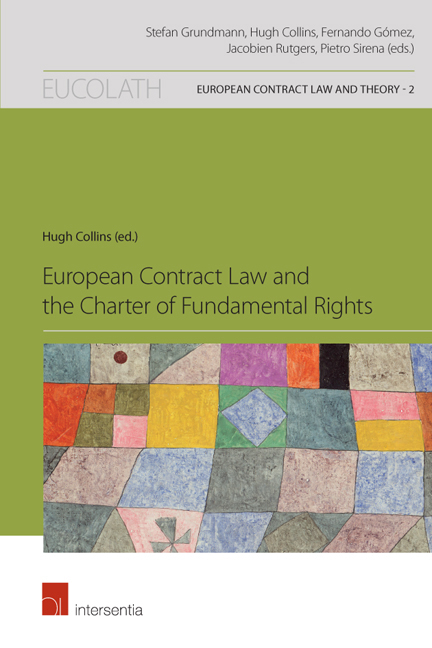Book contents
- Frontmatter
- Contents
- Table of Cases
- List of Authors
- Building European Contract Law on Charter Rights
- How Autonomous Should Private Law Be? Elements of a Private Law Constitution
- The Constitutional Transformation of Private Law Pillars through the CJEU
- Fundamental Rights before the Court of Justice of the European Union: A Social, Market-Functional or Pluralistic Paradigm?
- Minimum Harmonisation and Article 16 of the CFREU: Difficult Times Ahead for Social Legislation?
- The Right to Housing (Article 7 of the Charter) and Unfair Terms in General Conditions
- The EU Charter of Fundamental Rights and Consumer Credit: Towards Responsible Lending?
- The Justice Dimensions of the Relationship between Fundamental Rights and Private Law
- Discrimination and the Self-Employed: The Scope of Protection in an Interconnected Age
- The Effects of Fundamental Rights in Private Disputes
- Responsible Contracting: The Requirements of EU Fundamental Rights on Private Law Regimes
- Index
The Effects of Fundamental Rights in Private Disputes
Published online by Cambridge University Press: 22 September 2018
- Frontmatter
- Contents
- Table of Cases
- List of Authors
- Building European Contract Law on Charter Rights
- How Autonomous Should Private Law Be? Elements of a Private Law Constitution
- The Constitutional Transformation of Private Law Pillars through the CJEU
- Fundamental Rights before the Court of Justice of the European Union: A Social, Market-Functional or Pluralistic Paradigm?
- Minimum Harmonisation and Article 16 of the CFREU: Difficult Times Ahead for Social Legislation?
- The Right to Housing (Article 7 of the Charter) and Unfair Terms in General Conditions
- The EU Charter of Fundamental Rights and Consumer Credit: Towards Responsible Lending?
- The Justice Dimensions of the Relationship between Fundamental Rights and Private Law
- Discrimination and the Self-Employed: The Scope of Protection in an Interconnected Age
- The Effects of Fundamental Rights in Private Disputes
- Responsible Contracting: The Requirements of EU Fundamental Rights on Private Law Regimes
- Index
Summary
INTRODUCTION
Are fundamental rights, the sort of rights entrenched in written constitutions and human rights instruments, binding on individuals or other private actors? With few exceptions, most legal systems of the constitutional democratic type answer this question in the negative. The German Basic Law, for example, provides in Article 1(3) that ‘constitutional rights bind the legislature, the executive, and the judiciary’, which means that they bind all the three standard state powers but not private actors such as individuals, corporations, labor unions and the like. Similarly, the Fourteenth Amendment to the United States Constitution provides that ‘no State shall make or enforce any law which shall abridge the privileges or immunities of citizens of the United States’. The US Supreme Court developed a notoriously large and obscure body of case law on the basis of this seemingly harmless provision – the so-called'state action doctrine’– the gist of it being that constitutional rights do not bind private actors unless they are acting as surrogates of the state or are endowed with public prerogatives. What it all comes down to is rejection of the view that fundamental rights normally bind private as well as public actors or that such rights produce not only ‘vertical’ but ‘horizontal’ effect as well.
But this is hardly the end of the story. Even if fundamental rights cannot be invoked in private relations – meaning, for instance, that the plaintiffcannot base her complaint on the defendant's violation of a constitutional entitlement or that the defendant cannot invoke a constitutional liberty to evade liability – they are fully operative against the state in its capacity as legislator, executive or judge. Imagine the standard hypothetical of a landlord that sues the tenant for breach of a term in the lease that placed the latter under an obligation to attend mass every Sunday and to decorate the premises with religious paraphernalia. While the doctrine of vertical effect bars the tenant from invoking freedom of religion against the landlord, he may do so against the court itself qua enforcer of the lease and against the legislature qua author of the laws which empower private parties to create legal obligations inconsistent with freedom of religion.
- Type
- Chapter
- Information
- European Contract Law and the Charter of Fundamental Rights , pp. 219 - 256Publisher: IntersentiaPrint publication year: 2017



